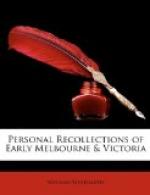DAVID CHARTERIS McARTHUR, FATHER OF VICTORIAN BANKING.
“A man of good repute, carriage, bearing, and estimation.” —Love’s Labour Lost.
Almost as early a colonist as Simpson, his intimate friend, his colleague in the Melbourne branch of the Bank of Australasia, of which he was himself general manager, with Simpson as director, McArthur fitly follows the other in this list of early colonial prominents. To the day of his death he held the first position, active or honorary, in Victorian banking. But he was even better known, or at least better regarded, as, par excellence, “mine host” of the early community. During a long life, of which the later and much the larger half was spent in Victoria, there was none who entered more readily, constantly, or acceptably into the varied life of the community. His leisure, such as he had, his means, his fellowship, were at their command. He was geniality personified. But he was a banker, and a banker has duties, and in the ups and downs of colonial business life, he was but too often reminded to that effect. It was quite a sight if you happened to witness the scene with a bank customer, to whom, as to “the state of his account,” it was necessary to administer what Mac’s countrymen call a “hearing.” Often he had to pity victims of circumstances in the sudden changes of colonial commerce; but “the gods aboon can only ken” to discriminate impartially in such cases, and duty to the bank must be done. First, the humorous twinkle in the eye sensibly abated, but it still lingered there, unless there must be still stronger stages of the ordeal, to bring the business culprit to reason. But when the last gleam went out, a storm was certainly imminent. The storm, however, swept past on the instant with the provocation. When that eye finally closed, a veritable sunbeam of the colony went out with it.
Mrs. McArthur, who still survives, went hand in hand with her husband. That they were an attached couple has the complementary illustration of his making her his full heir. As they had no family to divide cares and means, we must blame the less the surpassing hospitalities that distinguished them. McArthur had really no other fault, unless indeed we must fall back on the general limitation which Adam Smith had to admit even in the excellence of his departed friend Hume; for, after all, a man can be good or perfect only “so far as the nature of human frailty will permit.”




